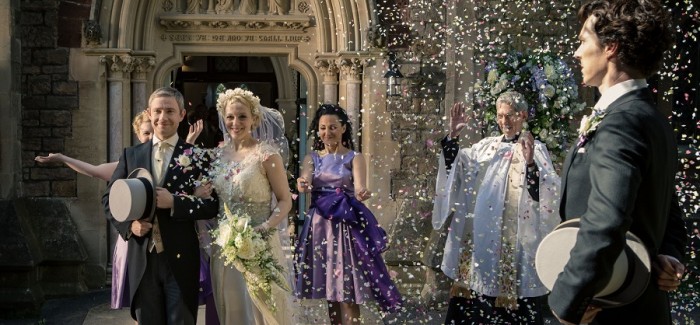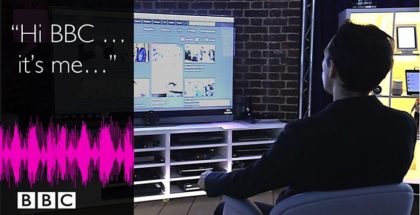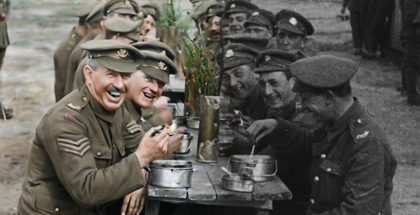Netflix UK TV review: Sherlock Season 3 Episode 2 (The Sign of Three)
Review Overview
Feelings
8.5Mystery
4Clueing for looks
8David Farnor | On 06, Jan 2014
Warning: This review contains mild spoilers.
We all know what to expect from a wedding, just as we all know what to expect from an episode of Sherlock, but The Sign of Three skipped the old, blue and borrowed and went straight for something new. Sherlock’s dangerous challenge this week? Delivering the Best Man’s speech at the wedding of John Hamish Watson.
It’s a big ask. Indeed, Holmes delivers a big speech – so big, in fact, that the speech easily takes up a whole hour. Two-thirds of a mystery thriller given over to matrimonial tradition? The Sign of Three felt less like an episode of Sherlock and more like an episode of a TV series which happened to star the characters of Sherlock. Is that a bad thing? Not necessarily.
In some ways, it’s the natural follow-on from The Empty Hearse, which spent more time exploring Watson (Martin Freeman) and Holmes’ (Benedict Cumberbatch) reunion than a briefly-mentioned terrorist plot. To paraphrase Sherlock’s address, Season 3 seems to be about lives instead of deaths.
The Sign of Three also continued last week’s move towards out-and-out comedy. After Sherlock’s bout of waitery disguise (complete with fake moustache), we now get to see him and Watson solving cases drunk – a hilarious sequence featuring a deadpan Alice Lowe as a nurse who thinks she slept with a ghost sees Benedict Cumberbatch stumbling around a flat, while his visual deductions display words like “sitty thing?” (when looking at an egg-shaped chair) followed by “sleeeeep”. “He’s clueing for looks!” shouts Martin Freeman, his half-smirking face a delight.
It’s these moments that remind you just how good our leads are together; not just as performers, but characters. They’re somewhat ungainly inserted, though, as flashbacks into Sherlock’s speech. The same is true of the mystery part of the plot: his laboured lecture recounts past cases, including the (ahem) elephant in the room and a neat nod to the original Sign of Four Conan Doyle story, plus the unsolved stabbing of a London palace guard.
Will any of these cases come to bear upon the happy nuptials? There are no points for guessing the answer, not least because some of the answers are staring us in the face from the beginning. Again, though, that seems to be the main aim of Steven Moffat and Mark Gatiss’ third season; Mycroft (Gatiss) and Molly (Louise Brealey) have always been the two key players in giving Sherlock a sympathetic side and, as well as giving them more screen-time, these last two episodes have explicitly focused on humanising the detective. He’s fallible, talks about relationship with his smarter sibling, says endearing things to Miss Hooper (who now spends her days forking her boyfriend in the hand) and pays tribute to Watson’s friendship – as well as John’s new spouse, Mary.
The emphasis is on emotion rather than murder – and, thanks to the cast’s superb performances (especially Amanda Abbington, who is brilliantly integrated to turn our crime-fighting duo into a trio), the pay-off will draw tears from even the most sociopathic of viewers.
It still doesn’t feel like Sherlock, though. Gone are the intricate enigmas, replaced by a freewheeling story with smoother, flowing editing. Sherlock: The Failed Sitcom or Sherlock: The Rom-Com are the easiest ways to dismiss it, but what The Sign of Three actually feels closest to is The Spy Who Loved Me.
Ian Fleming’s novella (his shortest) told the story of 007 rescuing a woman at a B&B from a gang of nasty men – from her perspective. An intentional decision by the author, the result was something that was widely panned by critics and fans. It’s no wonder that the eventual movie of the same name took the book’s title and nothing else.
Presenting its tricksy plotting from a sentimental angle with an unexpected framing device, The Sign of Three is perhaps best thought of as a similarly standalone Sherlock adventure. It’s written by Reichenbach and Blind Banker veteran Steve Thompson, but marks the series directorial debut of Colm McCarthy. With The Empty Hearse’s equally atypical structure helmed by Jeremy Lovering – another franchise first-timer – perhaps Season 3 marks storytellers bringing us their own take on Sherlock; a collection of a character-driven short stories rather than full-blown chunks of sleuthing literature.
Your attention may waver during Sherlock’s overlong oration, but (occasional frustration aside) the rambling comes across as awkwardly sincere more than self-indulgent; if Sherlock has been guilty of smugness in the past, now it appears to be shrugging off the complicated crimes for unabashed feelings. It can’t beat Reichenbach’s brain-boggling heights, so it goes for something else; matrimony trumping Moriarty.
The question is whether you’re prepared to commit to such a season. With Nick Hurran making another directorial debut next week with His Last Vow, the Season 3 climax – featuring a legendary blackmailer from the Conan Doyle days – may be the happy union of past and present that Sherlock fans will want. Either way, it’s certain that we’re in for something new. And after six 90-minute TV movies already under our belts, an unexpected trilogy could prove to be most satisfactory, dear Watson.
Sherlock is available on Netflix UK, as part of an £9.99 monthly subscription. It is also available on BritBox, as part of a £5.99 monthly subscription.
Where can I buy or rent Sherlock online in the UK?
Photo: BBC/Hartswood Films





















